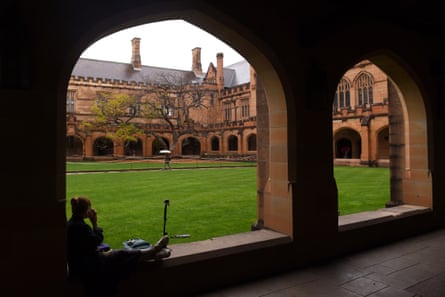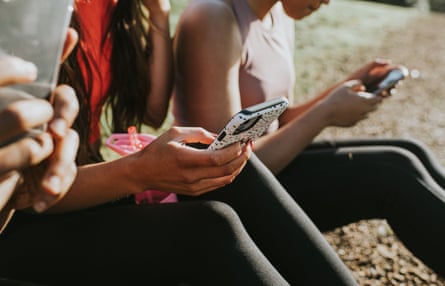I’ve been teaching at Australian universities for 25 years now. I began when I was 27 – I’m now 52. This means I’ve been next to university students since 1996, and if you’re curious about these things, you see patterns begin to emerge.
Every parent, every aunt or uncle, every grandparent, and in fact anyone who has anything to do with young people today is anxious about one thing: anxiety. It seems it’s on the rise. It is on the rise. Each semester I have more and more students with depression, obsessive compulsive disorder, some form of autism, borderline personality disorder, post-traumatic stress disorder and what I’m going to call Terror About The Future. All of these conditions cause anxiety.
I started to notice this a few years into my teaching, so, say, late 90s. I can remember conversations with my fellow academics about it. We were seeing increasing numbers of students who had various reasons to either not attend class or not hand in an assignment. For years the excuse had been (and often still is) I had three assignments to hand in. Back then I was a hard-arse and I’d say to my students That’s university. You should have been prepared. Then the excuse began to morph. Having three assignments to hand in became being very stressed and freaking out. Then freaking out began to be a documentable condition. Students began showing me doctors’ letters describing their severe anxiety, depression, stress and so on. (Later, by the way, this changed too: doctors’ letters would not name the problem, instead saying that their patients had a “condition” that made them “unable to study”.) If my colleagues and I had had the expression back then we would have described these students as snowflakes. I remember this situation reaching its 90s apogee when a student’s father contacted us to explain his daughter’s erratic behaviour and failure to do her work. We couldn’t believe it. Parents intervening in their children’s university lives! Unthinkable.

As you can see, we were pretty scornful about this. We compared our students’ lives with our own. I was 17 when I started uni in the late 1980s, and I had literally no idea what to expect from the experience. I was anxious and stressed too and, to be honest, frequently hungover. I had a job and I lived in a share house. I also frequently had three assignments due at once – assignments that not one of my tutors had bothered to explain to us. No introduction, no scaffolding, no essay plans; it was just, here’s the incomprehensible question, now go and answer it. I also had attendance requirements – I was allowed to miss three classes but no more, or else I would fail the subject.
School had been the same. When I was in Year 12 two of our friends were killed in a car accident, just six weeks before our HSC exams. We had no counselling, no acknowledgement beyond an announcement at the Monday assembly, and two funerals to attend in two days. I do vividly remember walking dazed through the playground on that sunny, pleasant spring Monday and passing our hated vice principal, who said to us (not kidding), “You wouldn’t want to be dead on a day like this.”
We did our exams, most of us didn’t flake, some of us went on to uni and some did not.
You might think I’m going to proceed by expressing outrage at the fact that my students are more medically documented than ever, more supported by counsellors and encounter groups and learning and teaching academics. All universities now have a special consideration process through which a student can apply for an extension because of problematic circumstances. All students at all universities can have what my last workplace called a “Learning Access Plan” – meaning a document that allows them certain types of leeway within a subject, including sometimes limitless extensions, special exam conditions, access to extra tuition and so forth. You might think that I should be outraged, as I once was, that most universities no longer have attendance requirements, meaning that students can access enough material online to pass a subject without coming to a single class. You might think that I would be sick to death of students asking for extensions because they have work, they feel sick or overwhelmed, and even, in one case (I love the boldness of this one), that they have a concert to go to. I can see as I write this that it’s often the need to multitask that stresses my students out. One assignment, one engagement, sure. Any more and their composure quickly disintegrates.
But my years of teaching – and the fact that I have two teenagers and a university student at home – have changed my attitude to this storm of disability. Every parent I know is worried about their child’s anxiety levels (and they felt that way before the pandemic, which of course is its own special subject). I’ve talked endlessly about the reasons for this with friends and colleagues, including fellow parents at my children’s schools, social workers, teachers, psychologists. A primary school teacher friend thinks the problem has two causes: first, parent anxiety; second, Terror About The Future.
This friend taught much of 2021 by Zoom, and she was shattered, as you’d expect, but most particularly by the demands of parents who were worried that their child was in some way falling behind. Or not feeling included. Or needed the lesson tailored to her particular “learning style”, or the teacher to spend more one-on-one time with her, counselling her, encouraging her, making sure she was participating in “healthy relationships”. Actually all of these worries are robustly present with or without a pandemic. And children pick this up.
And Terror About The Future? My teacher friend and I agree this is a very present fear for our children, obviously severely exacerbated by Covid. Once a child graduates to having a smartphone they carry bad news in their pockets every day, buzzing and buzzing to remind them that the world is going to hell. In an essay on Jia Tolentino’s Trick Mirror: Reflections on Self-Delusion, my 20-something student Tom Paech described his generation as being “agonisingly well-informed” – a perfect phrase to describe young people who have “no means of remedying the situation, like the captain of a sinking ship who knows exactly where the hole is in the hull but has no way of plugging it”. Note his use of the word “captain”, which I know was partially unintentional. These young people don’t just feel like the crew on a sinking ship. They feel like they’re the captain, which suggests they are helplessly responsible while the ship goes down.
I find myself saying “the medium is the message” a lot these days. In 1967 Marshall McLuhan said: “The ‘content’ of any medium blinds us to the character of the medium … All media work us over completely. They are so pervasive in their personal, political, economic, aesthetic, psychological, moral, ethical and social consequences, they leave no part of us untouched, unaffected, unaltered.”
I do think that much of the stress my children and my students experience is because of the phones they carry with them. Without their phones they would still be fearful of the effects of climate change and pandemics, and they would still be looking down the barrel of a future with no prospect of job certainty, housing certainty or certainty about their health. But they wouldn’t be continually reminded of it, and not being continually reminded of it might make them feel more in control. Knowledge is meant to be power, but I wonder if our constant exposure to it is making us less powerful. If you’ve been doing what I’ve been doing, you’re checking daily Covid numbers, just to experience that sickening jolt of adrenaline when again they’ve gone up. I sometimes feel like a rat who has been trained to only want food when she is hurt in some way, not clever enough to understand that painful information might be better avoided in favour of staying hungry.

I threw this open to both Tom and another beloved student, Emma Kohen. Emma wrote: “I wonder if there’s a difference between the kind of cultural anxiety you’re talking about – which will persist as long as the world is fucked up, which is to say, for the foreseeable future – and Capital A Anxiety, as in the actual diagnosed disorder … I think the different forms pertain to different things. I think cultural anxiety is more big-picture stuff (climate change, Covid, nuclear war, whatever other clusterfuck is happening at any given time) and Anxiety™ is more … individual? Confrontation, phone calls, the thought of correcting the barista when they mishear your name so you just end up letting them call you the wrong name for three months … ”
Of course when I was Emma’s age I too was terrified of confrontation and correcting the barista (talking on the phone is a very 21st century fear). Some of this is just age-appropriate. But her response made me think about another discussion my friends, colleagues and I have been having over the last 25 years – which is that the rise in what Emma calls Anxiety™ might be because of increased rates of diagnosis. I think I did have Anxiety™ when I was 20, but as there was no name for it and no informed conversation about it among my friends (who all had it too), we just “managed” it. And, by the way, all of us have now seen psychologists.
Emma went on to say, “I don’t know if the distinction [between Anxiety™ and ‘big-picture stuff’] is important because they’re both just as serious and just as pervasive as each other. Plus they inform and exacerbate each other. Nowadays it seems impossible to have one without it morphing into the other at some point.
“I wonder if the increased rates of Anxiety™ are actually making our generation better prepared for whatever hellscape the world will devolve into next. At least for me, anxiety is my baseline state of existence, so this new wave of cultural anxiety sort of feels like business as usual, albeit on a much larger scale. I’m already anxious just from being alive, so what’s one more thing? Add it to the list.”
As Tom said: “I can’t help feeling … that we’re kind of fucked, regardless of how much time we spend on our phones.”
Emma agreed, saying: “I think what I’m saying is: look or don’t look. It doesn’t really make a difference, because you’ll probably end up anxious anyway. The information is always out there ready to be anxiety-inducing, it’s just when and how you hear about it that changes. Tragically I don’t know if it’s actually possible to not hear about things anymore.”
Increased rates of Anxiety™: more anxiety, or just more naming of anxiety? I’d say both, probably leaning towards the former. But I continue to believe that cultural and personal anxiety would be lessened for every human being, regardless of their age, if we weren’t engaged in what is now ceaseless communication with the world and each other. Snapchat, email, the news – it doesn’t matter, it’s always there. You can never rest.
Despite all this, I don’t think parents should take their teenagers’ phones away. Or maybe only at night, when they need their sleep or they might actually (gasp) feel like reading a book, or when there is literally no other way of helping them do something they have to do, like an assignment. What if my parents had tried to take the Smiths or Max Headroom or The Young Ones away from me? They would have been alienating me from my own culture, forcing me out of a conversation that was private, that had nothing to do with them.
All I can do – all you can do – is help them find some peace, with or without their phones. Listen to their anxiety. Accept it as real. Help them understand it isn’t just they who are experiencing it. Try to manage your own anxiety in a realistic, sustainable way. And try to do something about it, even if it’s just voting for a party whose leader didn’t dump a piece of coal on his desk to prove an irredeemably stupid point. Get outside with your kids, get some air and some sunlight and accept that their life is not your life, that its challenges and pleasures are different.

Besides, trust them: the other uptick I’ve observed in this generation is kindness. My students are infinitely kinder and more tolerant of one another than we were. They make a generous space for anyone with difficulties and they are willing to share their own difficulties to make that space a better place to be. They deploy a special and delightful kind of wit to deal with their cultural and personal anxiety. This, in another, separate email from Emma: “I did have a win at work today: I made a phone call (shudder) without crying afterwards! Huge deal! I will not be doing it again.”
What lovely creatures 20-year-olds are. How lucky I’ve been to know them, and how much they’ve taught me.
Future students: ask me for an extension. I can pretty much guarantee you’ll get it.
Tegan Bennett Daylight is a writer, teacher and critic. This is an edited extract from Griffith Review 75: Learning Curves

Comments (…)
Sign in or create your Guardian account to join the discussion